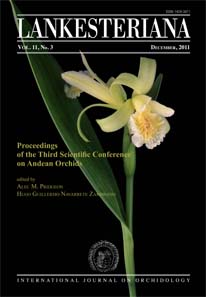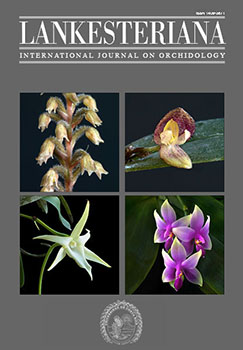Orchid seed stores for sustainable use: a model for future seed-banking activities
DOI:
https://doi.org/10.15517/lank.v11i3.18290Keywords:
orchids, seed stores, Cattleya quadricolor, conservationAbstract
Orchid Seed Stores for Sustainable Use (OSSSU) is a three-year UK Darwin Initiative project with the primary objective of setting up a global network of orchid seed banks, focusing initially on orchid biodiversity hotspots in Asia and Latin America. At the time of writing there are 31 participating institutions in 22 countries. In the longer term, our aim is to expand the network to include more institutions from around the world, from African countries in particular. We are confident that good-quality dry orchid seed has the potential to survive for many decades at conventional seed bank temperatures of around - 20 C. Participating institutions have been provided with seed storage tubes, together with funding to purchase a dedicated chest freezer and some consumables. Common protocols have been agreed to allow, for the first time, comparison of germination of seed of more than 250 orchid species from tropical and temperate countries over a wide range of habitat types on one germination medium (Knudson C) and to compare long-term viability. The role of OSSSU in both ex situ and in situ conservation is illustrated by the case of Cattleya quadricolor, a Colombian endemic. The story of C. quadricolor is a familiar one: loss of habitat combined with illegal collection of this beautiful species by commercial interests. However, here is a project in which all of the pieces of the orchid conservation jigsaw puzzle fit neatly into place: an up-to-date Red List for the orchids of Colombia to assist with targeting rare and endangered species, a National Action Plan for Cattleya species, participation in OSSSU, a group of amateur and professional growers with the necessary expertise to germinate seed for the project and produce seedlings, a committed commercial grower willing to provide plants for pollination and seed harvest, and a botanical garden willing to act as a focal point and to re-introduce plants of C. quadricolor raised by the project into a number of secure sites.
Downloads
Downloads
Published
How to Cite
Issue
Section
License
According to the Open Access policy promoted by the University of Costa Rica, all the papers published by Lankesteriana are licensed under the Creative Commons copyright and can be downloaded free of charge. The journal holds copyright and publishing rights under the CC BY-NC-ND 3.0 CR license.
Before the publication of the materials submitted by the author(s) in LANKESTERIANA, the author(s) hereby assign all rights in the article to the Lankester Botanical Garden.





